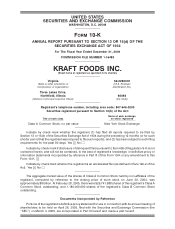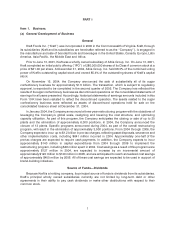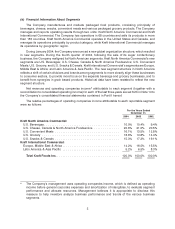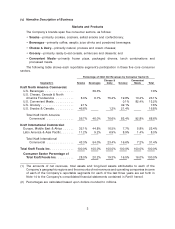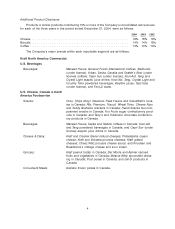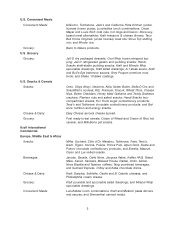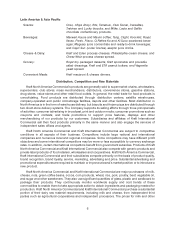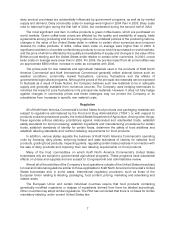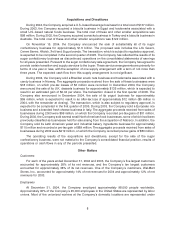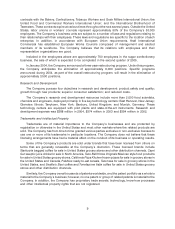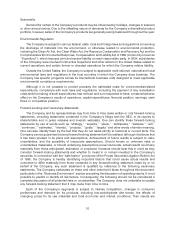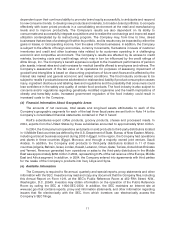Kraft 2004 Annual Report Download - page 2
Download and view the complete annual report
Please find page 2 of the 2004 Kraft annual report below. You can navigate through the pages in the report by either clicking on the pages listed below, or by using the keyword search tool below to find specific information within the annual report.PART I
Item 1. Business.
(a) General Development of Business
General
Kraft Foods Inc. (‘‘Kraft’’) was incorporated in 2000 in the Commonwealth of Virginia. Kraft, through
its subsidiaries (Kraft and its subsidiaries are hereinafter referred to as the ‘‘Company’’), is engaged in
the manufacture and sale of branded foods and beverages in the United States, Canada, Europe, Latin
America, Asia Pacific, the Middle East and Africa.
Prior to June 13, 2001, Kraft was a wholly owned subsidiary of Altria Group, Inc. On June 13, 2001,
Kraft completed an initial public offering (‘‘IPO’’) of 280,000,000 shares of its Class A common stock at a
price of $31.00 per share. At December 31, 2004, Altria Group, Inc. held 98.0% of the combined voting
power of Kraft’s outstanding capital stock and owned 85.4% of the outstanding shares of Kraft’s capital
stock.
On November 15, 2004, the Company announced the sale of substantially all of its sugar
confectionery business for approximately $1.5 billion. The transaction, which is subject to regulatory
approval, is expected to be completed in the second quarter of 2005. The Company has reflected the
results of its sugar confectionery business as discontinued operations on the consolidated statements of
earnings for all years presented. Accordingly, historical statements of earnings amounts included in this
Form 10-K have been restated to reflect the discontinued operation. The assets related to the sugar
confectionery business were reflected as assets of discontinued operations held for sale on the
consolidated balance sheet at December 31, 2004.
In January 2004, the Company announced a three-year restructuring program with the objectives of
leveraging the Company’s global scale, realigning and lowering the cost structure, and optimizing
capacity utilization. As part of this program, the Company anticipates the closing or sale of up to 20
plants and the elimination of approximately 6,000 positions. In 2004, the Company announced the
closure of 13 plants. Specific programs announced during 2004, as part of the overall restructuring
program, will result in the elimination of approximately 3,500 positions. From 2004 through 2006, the
Company expects to incur up to $1.2 billion in pre-tax charges, reflecting asset disposals, severance and
other implementation costs, including $641 million incurred in 2004. Approximately one-half of the
pre-tax charges are expected to require cash payments. In addition, the Company expects to incur
approximately $140 million in capital expenditures from 2004 through 2006 to implement the
restructuring program, including $46 million spent in 2004. Cost savings as a result of this program were
approximately $127 million in 2004, are expected to increase by an incremental amount of
approximately $120 million to $140 million in 2005, and are anticipated to reach annualized cost savings
of approximately $400 million by 2006. All of these cost savings are expected to be used in support of
brand-building initiatives.
Source of Funds—Dividends
Because Kraft is a holding company, its principal source of funds is dividends from its subsidiaries.
Kraft’s principal wholly owned subsidiaries currently are not limited by long-term debt or other
agreements in their ability to pay cash dividends or make other distributions with respect to their
common stock.
1

